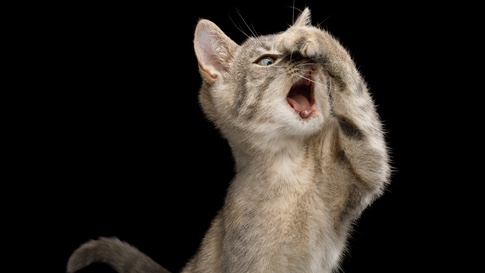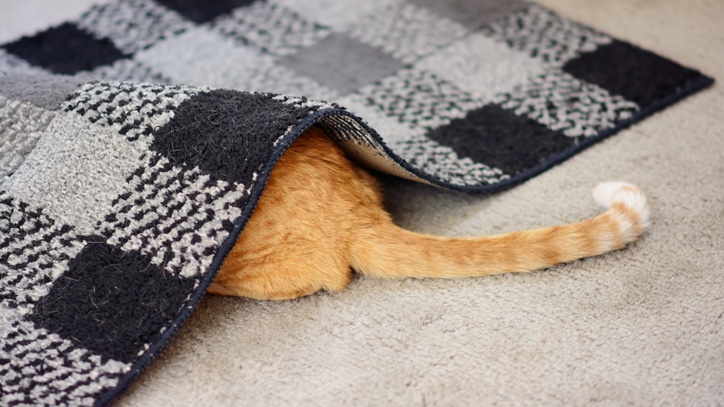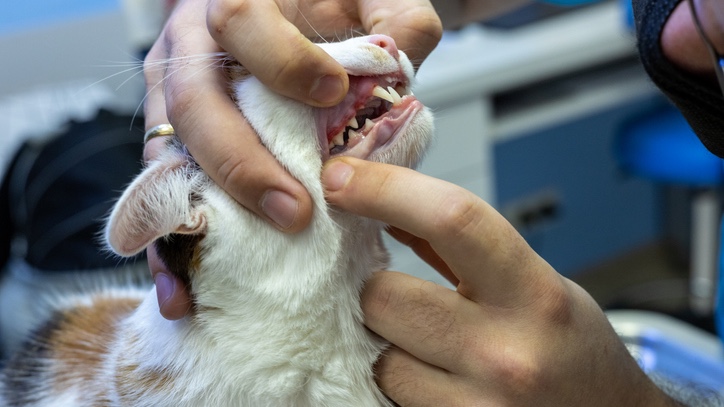My cat is smelly – what can I do?
If your cat is smelly, it's not your fault! But there's likely an underlying issue that you will need to sort

If your cat is smelly, then it generally indicates a problem. After all, cats are known for being clean animals with a high level of personal hygiene and they spend a large amount of their (waking) day grooming themselves using their tongue and paws.
So while you could invest in the best cat shampoo to reach those places that a cat may be neglecting, in reality, you shouldn't need to do so all that often. The fact, however, that you're asking about smells requires further investigation. And don't worry: most issues can be resolved.
Why does my cat smell so bad?
As we've said, for most of the time, cats will be fastidious in their self-care and largely odorless so if a cat smells bad, then you're going to know about it rather quickly. The first thing you must work out, however, is where the smell is coming from – and the only real way of doing that is to get your nose relatively close to your cat and have a good sniff around.
To do this, learn how to pick up a cat correctly and smell around the face, body and, yes, rear end (sorry, but it has to be done). You don't need to stick your nose into the fur. If you'd already noticed a foul smell, then chances are you'll soon pick up on where it's coming from and it's at that point that you can begin to work out the issue and what you can potentially do about it.
Reasons your cat may stink
SKIN ODOR
Any odors that are coming around the cat's body is generally down to the skin and coat. It's a good idea, then, to check the general state of the fur – it could simply be that your cat has gotten particularly dirty – but if the coat looks fine then carefully tease your way through the fur to look for wounds. There is a chance that a wound has become infected and it will smell particularly bad.
General skin infections will also be whiffy so look for signs of damage or irritation to your cat's body. Often the coat can feel greasy in such circumstances, especially so if your cat isn't grooming well enough. Infections can be caused by parasites, immune disorder and even cancer so if you do suspect a skin odor, it's always worth a visit to the vet.
Get the best advice, tips and top tech for your beloved Pets

REAR END ODOR
A cat's bottom is sure to smell when you get sufficiently close but you're trying to spot particularly foul odors. This could be caused by diarrhea in cats and you'll notice signs of stools around the bottom in this case because it's likely your feline friend hasn't been able to sufficiently clean the area – more so if the problem keeps repeating.
Cat constipation is also an issue. You will pick up on smells because liquid poo can often get around the hardened, constipated lump and leave the body. Indeed, any signs of cat poop on the body is going to cause a distinctive feces smell as is frequent flatulence. Likewise, if you're smelling ammonia then it may indicate a urinary tract infection.
Should the smell be musky or fishy, though, the odor is likely coming from the anal glands. If it is persistent, then it's likely to be a sign of infection or inflammation. If not, you're simply smelling the product of a cat's excitement, fear or stress since the odor is released during such times. By all means, check for anxiety in cats in order to tackle any issues but still consider a visit to the vet.
EAR INFECTION
It's worth checking around the ears too. These can be smelly areas and the odors are often caused by ear mite infestations, bacterial ear infections or yeast infections. You don't always need to smell a cat to notice an issue in this area either because a cat may end up scratching at their ears far more than normal. Go to the vet immediately if a cat has smelly ears so that the problem can be treated.
My cat has smelly breath

There's also another potentially smelly area that we're going to look at separately: the mouth. It's perfectly possible your cat has smelly breath but before you become worried, just work out what your kitty has been doing: if they've just eaten a plate of salmon and their breath stinks of fish, you can generally rule out an issue. But halitosis can have serious underlying causes.
Check your cat's teeth first and foremost. They should look healthy with little to no plaque and tartar build-up otherwise you may find the gums have become inflamed or that some teeth are becoming loose. Inflammation of the mouth is indicative of stomatitis in cats and it can range from mild to severe. Bad breath is usually the first sign and it can be accompanied by trouble chewing and swallowing.
Look for signs of ulcers, wounds and growths and visit a vet if the bad breath continues. A vet will also want to rule out diabetes, kidney and liver disease. As in humans, the mouth can be a great pointer for illness and catching something early is going to ensure it's easier to treat or cure.
Should I bathe my cat if he stinks?
As you'll have read, there are many different reasons why a cat may smell and you're not going to necessarily resolve the issue by introducing a kitty to water. Sure, there are ways to bathe a cat that will remove any dirt they may have picked up while also leaving a kitty smelling fresher. But it's always best to take the advice of a vet who will look at the specific cause of a cat's odor and work on ways of tackling it.
Read next: I had no idea my cat had gingivitis! Here's how to prevent it or what is gingivitis in cats?

David Crookes has been a journalist for almost 30 years and he has written for a host of magazines, newspapers, websites and books including the World of Animals Annual, BBC Earth, Live Science, The Independent and Tom’s Guide.
Born in England, he lives with two cats but he’s also keenly interested in the differences between the huge number of dog breeds – in fact, you can read many of his breed guides that he’s written in collaboration with vets here on PetsRadar.
With a lifelong passion for technology, too, he’s always on the lookout for useful devices that will allow people to keep their pets happier and healthier, and provide them more time to spend together.
David has a degree from Durham University, as well as postgraduate diploma in journalism from the University of Central Lancashire.
